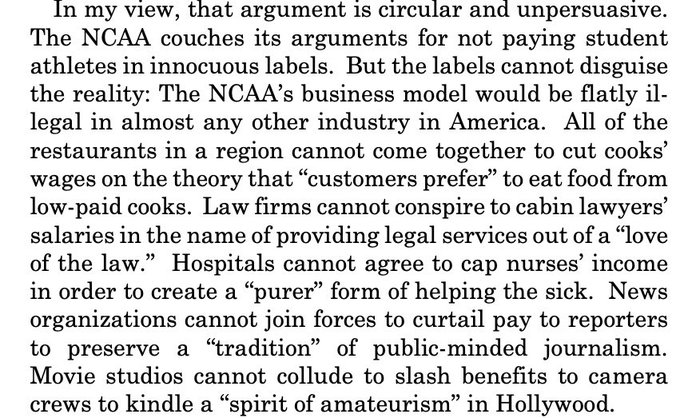6.30 Bill Cosby‘s conviction was overturned.
6.30 Donald Rumsfeld dies at 88. George Packer in The Atlantic: “Rumsfeld was the worst secretary of defense in American history. Being newly dead shouldn’t spare him this distinction. He was worse than the closest contender, Robert McNamara, and that is not a competition to judge lightly. McNamara’s folly was that of a whole generation of Cold Warriors who believed that Indochina was a vital front in the struggle against communism. His growing realization that the Vietnam War was an unwinnable waste made him more insightful than some of his peers; his decision to keep this realization from the American public made him an unforgivable coward. But Rumsfeld was the chief advocate of every disaster in the years after September 11. Wherever the United States government contemplated a wrong turn, Rumsfeld was there first with his hard smile—squinting, mocking the cautious, shoving his country deeper into a hole. His fatal judgment was equaled only by his absolute self-assurance. He lacked the courage to doubt himself. He lacked the wisdom to change his mind.”
6.30 Rick Perlstein in New York: “What Democrats have been slow to understand is that this is an insurgency against democracy with parliamentary and paramilitary wings.”
6.29 Jamie Lyn Spears: “I can assure you that I’ve supported my sister long before there was a hashtag.”

6.26 Hello, Ivy.
6.23 Gen. Mark A. Milley, chairman of the Joint Chiefs of Staff, after Rep. Matt Gaetz suggested that reading critical race theory was making army officers woke'': “I personally find it offensive that we are accusing the United States military, our general officers, our commissioned and noncommissioned officers, of being, quote, ‘woke’ or something else because we’re studying some theories that are out there.” Milley said it is important for military members to be open-minded and to be exposed to unconventional ideas. “I’ve read Mao Zedong. I’ve read Karl Marx. I’ve read Lenin. That doesn’t make me a communist. So what’s wrong with understanding, having some situational understanding, about the country for which we are here to defend?. . . .I want to understand white rage, and I’m white. What is it that caused thousands of people to assault this building and try to overturn the Constitution of the United States of America? What caused that? I want to find that out.”
6.22 Heather Cox Richardson: There were three important takeaways from today’s Senate vote on whether to begin debate on S1, the For the People Act, the bill that would protect voting rights, end partisan gerrymandering, establish new ethics rules for federal officials, and curb big money in politics. The first is that Senator Joe Manchin (D-WV) voted with the rest of the Democrats to move the measure forward. This means that he is confident that his compromise ideas will be inserted into the final bill and that the Democrats are united. Tonight, the White House nodded to Manchin when it applauded “efforts in the Senate to incorporate feedback that refines and strengthens the bill, and would make its reformers easier for the states to implement.” The same White House statement offered strong support for the For the People Act, saying, “Democracy is in peril, here, in America. The right to vote—a sacred right in this country— is under assault with an intensity and an aggressiveness we have not seen in a long time.” It pointed to the 2020 election and the January 6 insurrection to remind us that “our democracy is fragile” and that we need legislation to “repair and strengthen American democracy.”The second takeaway is that all 50 of the Republicans voted against the measure, which would have helped to combat the voter suppression laws being enacted by Republican-dominated legislatures across the country. According to the nonpartisan Voting Rights Lab, 18 states have put in place more than 30 laws restricting access to the ballot. These laws will affect around 36 million people, or about 15% of all eligible voters. Led by Senate Minority Leader Mitch McConnell (R-KY), Republicans insist that federal protection of voting rights is federal overreach; that the states should be in charge of their own voting rules. As Susan Collins (R-ME) put it: “S. 1 would take away the rights of people in each of the 50 states to determine which election rules work best for their citizens.” And the third takeaway is that the Republicans are defending the same principle that Senator Stephen A. Douglas advanced when he debated Senate candidate Abraham Lincoln in Illinois in 1858.Four years before, Douglas had led Congress to throw out the 1820 Missouri Compromise, a federal law that kept the system of Black enslavement out of the land above the southern border of the new slave state of Missouri, in land the U.S. had acquired through the 1803 Louisiana Purchase. Eager to enable a transcontinental railroad to run west of Chicago, Douglas introduced a bill to organize a territory in that land in 1854 but, knowing that southern senators would never permit a new free territory that would eventually become a free state without balancing it with a slave state, he wrote a bill for two new territories, not one.Both were in territory covered by the Missouri Compromise and thus should have been free under federal law. But Douglas insisted that true democracy meant that the people in the territories should decide whether or not they would welcome slavery to their midst. Working as a lawyer back in Illinois, Lincoln recognized that this “popular sovereignty” would guarantee the spread of Black enslavement across the West, since under the Constitution, even a single enslaved Black American in a territory would require laws to protect that “property.” Slave states would eventually outnumber free states in Congress, and their representatives would make human enslavement national. In 1858, when Lincoln, now a member of the new Republican Party, challenged Democrat Douglas for his Senate seat, the key issue was whether Douglas’s “democracy” squared with American principles. Lincoln said it didn’t. Local voters should not be able to carry enslavement into lands that a majority of Americans wanted free. He did not defend civil rights, but he insisted that the framers had deliberately tried to advance the principles of the Declaration of Independence by using the federal government to limit the expansion of enslavement. Douglas insisted it did. In his view, democracy meant that voters in the states and territories could arrange their governments however they wished. But central to that belief was who, exactly, would be doing the arranging. “I hold that this Government was made on the white basis, by white men, for the benefit of white men and their posterity forever, and should be administered by white men and none others,” he said. Claiming that he, not Lincoln, was “in favor of preserving this Government as our fathers made it,” he told an audience in Jonesboro, Illinois, “we ought to extend to the negro every right, every privilege, every immunity which he is capable of enjoying, consistent with the good of society. When you ask me what these rights are, what their nature and extent is, I tell you that that is a question which each State of this Union must decide for itself.” His own state of Illinois, he pointed out, rejected Black enslavement, “but we have also decided that… that he shall not vote, hold office, or exercise any political rights. I maintain that Illinois, as a sovereign State, has a right thus to fix her policy….” I found it chilling to hear Douglas’s argument from 1858 echo in the Senate today, for after seeing exactly how his argument enabled white southern legislators to cut their Black neighbors out of the vote in the 1870s and then pass Jim Crow laws that lasted for more than 70 years, our lawmakers should know better. How is it possible to square states’ rights and equality without also protecting the right of all adult citizens to vote? Unless everyone has equal access to the ballot, what is there to stop Douglas’s view of “the good of society” from coming to pass yet again? Congress will recess after Thursday and won’t resume business until July 12. The big push to pass a voting rights measure will happen then.
6.22 Will Leitch in New York: Whenever one has argued for college athletes to be paid, those who defend the current system have responded with some variation of, “Okay, how would you fix it?” This was a reasonable question. Do you pay some athletes but not all of them? Do colleges have to dig into their non-athletic funds? Do players get traded from one school to another in the middle of the school year? Do they even bother going to school at all? I always struggled to come up with answers to these questions, about how to reconcile the college sports I love with the financial and logistical realities of the situation. It used to frustrate me. But then I realized that throwing the question back at anyone who asked it was simply a way to deflect from complicity with an unjust system. What do you have that’s better? is not a defense of a corrupt model; it is a way to maintain your place in it. Whether you were a coach making millions off unpaid labor, a university or conference (or an organization like the NCAA) cashing billions in television checks, or just a fan who loved watching college sports so much that you never wanted it to change, defending the current way of doing things required rhetorical jujitsu. And that was a sure sign that it wasn’t really worth defending. What the Supreme Court and Kavanaugh did on Monday was flip the focus: Now it’s up to the NCAA and administrators and university presidents to come up with a plan to save their sports — or else. The NCAA not only has to justify its own existence; it has to justify the entire notion of college athletics.
6.22 Justice Kavanaugh for the majority:

6.22 Sports Illustrated: With thousands of players and millions of innings after almost a century and a half of organized baseball, it’s rare for there to be something that has never, ever been done before. But as Sarah Langs of MLB.com pointed out on Twitter on Monday … this falls into that category. deGrom’s 0.50 ERA is the lowest by any pitcher in his first 12 starts of the season since earned runs began being tracked in 1913. His 0.51 WHIP is the lowest by any pitcher over a 12-start span since 1901. He is the first pitcher with this many strikeouts and this few hits in 12 games. And on and on and on. But the most dramatic number of them all might be ERA+, putting him on a theoretically level playing field, adjusted for scoring environment and opponents, made for comparisons just like this. Think of the best pitching seasons of all time: 2000 Pedro Martínez (291 ERA+), or 1994 Greg Maddux (271), or 1968 Bob Gibson (258) or 1913 Walter Johnson (259). And then think of the fact that 2021 deGrom’s ERA+ is 777. His year is not just better than all of the storied ones listed above. It’s better several times over. The gap between 2021 deGrom and 2000 Pedro Martínez is bigger (far bigger!) than the gap between 2000 Pedro Martínez and a league-average pitcher. How are you supposed to conceptualize a pitcher like that?
6.20 Visiting Fort William Henry at Lake George.


6.20 Sealing a 2-1 victory over the A’s, the Yanks turn a triple play–their third of the season, their third in 27 games–becoming thr eighth team in MLB history to turn three triple plays in one season.

6.17 While defeating the Blue Jays 8-4, the Yankees turn their second triple play of the season, the first 1-3-6-2-5-6 triple play in MLB history.
6.17 Janet Malcolm dies at 86. Her immortal sentence: “Every journalist who is not too stupid or too full of himself to notice what is going on knows that what he does is morally indefensible.”
6.17 The Supreme Court let the Affordable Care Act survive.
6.17 Juneteenth becomes an official federal holiday.
6.16 Ivy Elizabeth Weatherington, 8.1 pounds, born 11:16 PM. Welcome.

6.16 Biden, about to leave Europe, as reported in Axios: Biden said the Capitol riot had reinforced “what I got taught by my political science professors and by the senior members of the Senate that I admired when I got there — that every generation has to reestablish the basis of its fight for democracy. I mean, for real, literally have to do it.”
6.16. Biden after meeting Putin: “This is not about trust. This is about self-interest and verification of self-interest. . . .This is about practical, straightforward, no-nonsense decisions that we have to make or not make.”
6.15 Seventy percent of New Yorkers have received at least one shot. Governor lifts nearly all restrictions, Cuomo: “We can now return to life as we know it”
6.15 Deaths from Covid in the US surpass 600,000.
6.13 Ned Beatty dies at 83. “You have meddled with the primal forces of nature, Mr. Beale, and you must atone.”
6.12 Ron Brownstein in The Atlantic: While senator Joe Manchin is demanding that both parties agree on any further federal voting-rights legislation, a new study quantifies how completely Republicans have excluded Democrats from the passage of the restrictive voting laws proliferating in red states. In places such as Florida, Georgia, Arizona, Iowa, Kansas, and Montana, the most restrictive laws approved this year have passed on total or near-complete party-line votes, with almost all state legislative Republicans voting for the bills and nearly all Democrats uniting against them. . . .That pattern of unrelenting partisanship has left many state-level Democrats incredulous at the repeated insistence by Manchin. . . that he will support new federal voting-rights legislation only if at least some Republican senators agree to it. Manchin is “acting like Republicans and Democrats are working together on this stuff, and Republicans in Arizona have completely shut the Democrats out of the [legislative] process,” Katie Hobbs, the Democratic secretary of state there, told me in an interview. Similarly, Jennifer Konfrst, the Democratic whip in the Iowa House of Representatives said, “It is unfathomable to me that we would look at this issue and say we have to bring Republicans along, in this political climate, in order to make true change. I don’t see anywhere where Republicans are inviting Democrats along.’”

6.11 Darnella Frazier, the teen who filmed George Floyd’s murder, awarded a Pulitzer citation
6.11 This morning at Kinns Woods.

6.9 Henry Olsen in the Post: Those who say that the GOP is Trump’s fiefdom are wrong. The barons are restless, and many of the peasants want a new king. Don’t be surprised if these factors depose Trump from his metaphorical throne before the next presidential cycle begins.
6.8 Pro Publica: “[The 25 richest Americans] saw their worth rise a collective $401 billion from 2014 to 2018. They paid a total of $13.6 billion in federal income taxes in those five years, the IRS data shows. That’s a staggering sum, but it amounts to a true tax rate of only 3.4%. It’s a completely different picture for middle-class Americans, for example, wage earners in their early 40s who have amassed a typical amount of wealth for people their age. From 2014 to 2018, such households saw their net worth expand by about $65,000 after taxes on average, mostly due to the rise in value of their homes. But because the vast bulk of their earnings were salaries, their tax bills were almost as much, nearly $62,000, over that five-year period.
6.8 The Atlantic: George Packer argues that the country has fragmented into four groups, each informed by a distinct narrative about the nation’s moral identity. These narratives “overlap, morph into one another, attract and repel one another.” The groups are:
1. Free America Libertarians who resent regulation in favor of individual freedom, tracing a through line from Ronald Reagan to Newt Gingrich to Ted Cruz
2. Smart America A class of high earners and technocrats who attend competitive schools, embrace meritocracy, own MacBooks, and don’t intermingle with the rest of the country
3. Real America White Christian nationalists, as recently energized by Sarah Palin and Donald Trump
4. Just America A young generation that believes injustice is at the heart of the country’s problems and speaks the language of identity politics
All four narratives, Packer argues, “emerged from America’s failure to sustain and enlarge the middle-class democracy of the postwar years”—and all four are helping pull the country apart.
